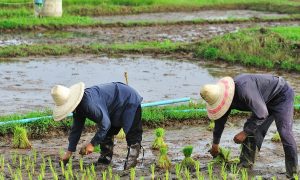India extends curbs on rice exports with 20% duty on parboiled variety

India has implemented a 20% export duty on parboiled rice, as confirmed by a notification from the finance ministry on Friday. This action comes in the wake of an earlier prohibition on shipping non-basmati white rice and broken rice, which were respectively announced in September 2022 and the preceding month, a response to the surging prices of this dietary staple.
Although the finance ministry says that the export duty comes into force with immediate effect, the exporters who have contracted earlier (before the notification date) are allowed to export their consignments at zero duty until 15 October.
A report by Mint on 22 August initially disclosed the Indian government’s contemplation of this 20% duty on exports of non-basmati parboiled rice. The objective behind this move is to stabilize prices and bolster inventory within the domestic market, countering the persistent inflationary pressures that have been exacerbated by the escalating costs.
Firm prices of rice domestically have been a concern despite the government restricting exports of non-basmati white rice on 20 July, three days after Russia pulled out of the Black Sea grain deal. Prices of parboiled rice have risen 19% since April in the domestic market and 26% in the international market, while the export quantity and value of the rice variety shot up 21% and more than 35%, respectively.
“Though negative emotions among millers in the market may see a short-term correction, no major impact is expected on prices as stock of paddy is depleting and monsoon is also in deficit,” Suraj Agarwal, CEO of Rice Villa brand, said.
Currently, all-India average retail parboiled rice is available at ₹37-38 a kg and ₹92-93 for basmati rice. Traders said that free-on-board (FoB) parboiled rice price is around $500 a tonne and $1,000 a tonne for basmati varieties. India has a share of around 25-30% of the global parboiled rice trade.
Retail inflation in rice rose to 12.96% in July from 12% in June and 4.3% in July 2022.
The repercussions of the ban have been most acutely felt by economically disadvantaged populations in countries such as Bangladesh and Nepal, who rely on Indian white rice. Similarly, African nations including Benin, Senegal, Togo, and Mali, which primarily import broken rice – a cost-effective and highly satiating variety – have also been severely affected.
The export prohibition implemented by India last month has triggered a notable surge in global rice prices, registering an increase of 15-25%. Consequently, nations in West Africa have had to transition to utilising Indian parboiled rice to fulfill their domestic consumption needs. This shift was prompted by the elevated price quotes from India’s competitors like Thailand, Vietnam, and Pakistan.
This dynamic has led to a discernible uptick in India’s parboiled rice exports during the current fiscal period, amounting to approximately 3.1 million metric tons compared to the 2.58 million metric tons recorded during the same period in the previous fiscal year, as indicated by government data.















